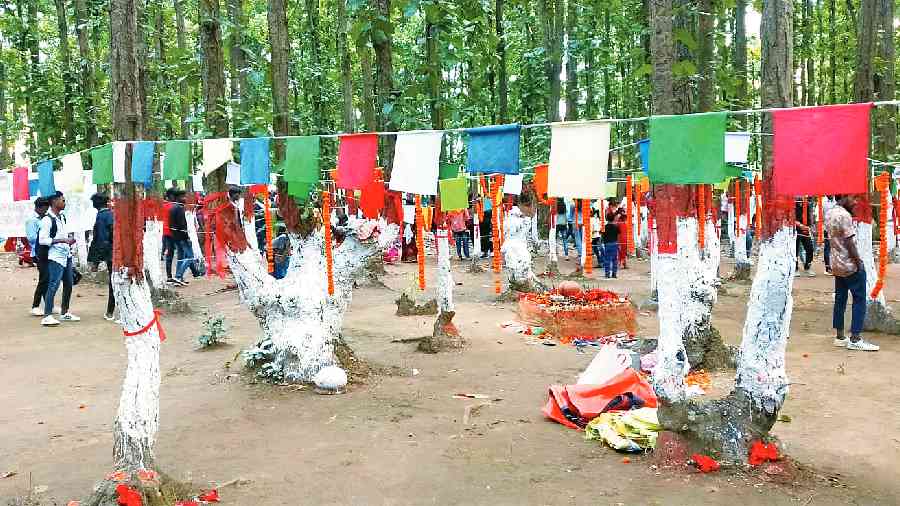A unique invocation of forests, done in a Hazaribagh jungle in Jharkhand for the past 27 years, largely went unnoticed by the rest of the state.
The villagers of the Tatijharia area of Hazaribagh district worshipped the forest near Dudhmatia village, about 30km away from Hazaribagh town, on Friday morning, tied rakhi (bands) around trees and also organised a mela with an aim to protect the forest and wildlife.
“We have been organising this since 1995 but it was actually the silver jubilee year as no mela could be organised for the past two years because of the Covid-19 pandemic,” informed Khemlal Mahto, a college teacher who is closely involved with the initiative.
Organised by Vanyaprani Suraksha Samiti in association with the state forest department, the mela is normally referred to as paryavaran (environment) mela or even Brikshon ka rakhi bandhan, Khemlal informed, adding many even call it Van Mahotsav.
“The people living in surrounding villages throng the mela in large numbers, sometimes crossing the 50,000 mark. Students from almost all the schools in the area visit the mela,” Khemlal further informed, adding the schoolchildren present skits and dance performances on related topics and even go around dressed as birds and animals.
Some NGOs working in the field also attend the mela and put up stalls for spreading awareness about topics such as the conservation of forests and water or the need for discarding plastic, he said.
“I went to this mela for the first time eight years ago and have been attending it regularly since then,” said Mrityunjay Sharma, secretary of the Canary Eco Club of Hazaribagh, adding they also put up a stall this year for creating awareness about water conservation among rural masses.
“The mela now attracts a huge gathering but it was not the same when it was initiated by Mahadev Mahto, a retired school teacher in his late seventies,” informed Raju Yadav, a local journalist who is also one of the organisers, adding Mahadev Ji also briefly attended the mela this year, despite his old age.
“There was a specific reason behind this initiative,” Khemlal replied when asked what prompted the teacher to begin such a mela.
A herd of elephants would often stray into Dudhmatia village and cause damage to standing crops and properties of the villagers, he informed, adding Mahadev Ji wanted to do something to eradicate the problem.
“He realised that shrinkage of their habitat and lack of enough foliage in forests forced the elephants to venture into villages. Mahadev Ji wanted to save forests so that elephants would remain confined there and spare the villages,” Khemlal said.
The example of the Chipko Movement that originated in the Himalayan region of Uttarakhand in the 70s also worked as an inspiration and the initiative, despite initial hurdles, finally met with success, Khemlal added.
The rituals like worshipping the forest and tying rakhi on the trees certainly helped develop an attachment between villagers and trees and a motivation for protecting the forests, they believe.
"The positive impact is visible," claimed journalist Yadav, explaining no one cut trees there and as a result, the trees have now grown taller resulting in the forest becoming denser than before.










